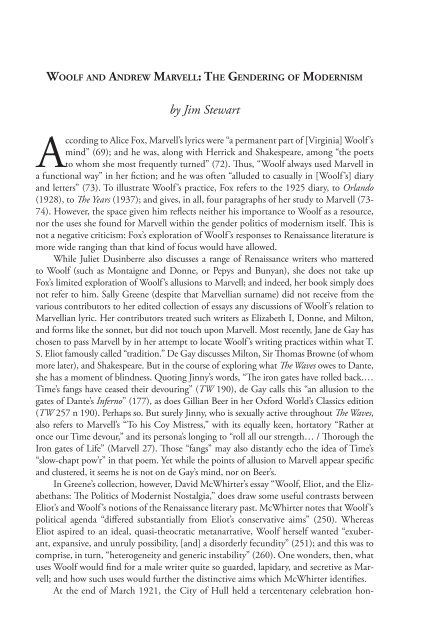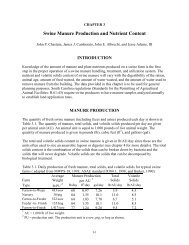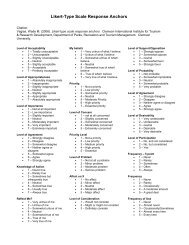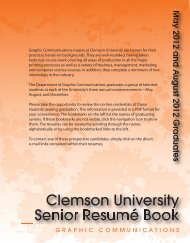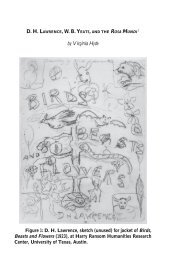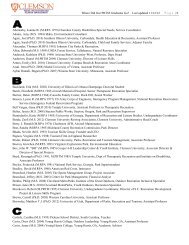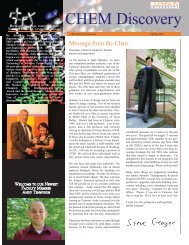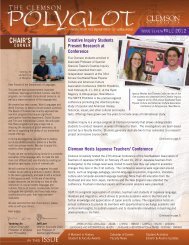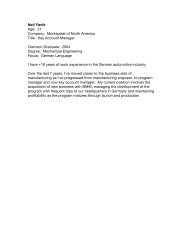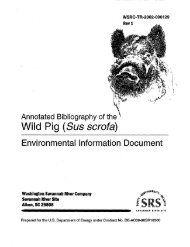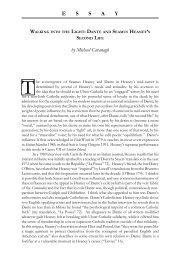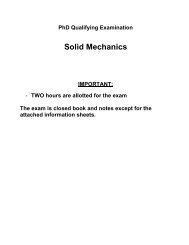Woolfian Boundaries - Clemson University
Woolfian Boundaries - Clemson University
Woolfian Boundaries - Clemson University
Create successful ePaper yourself
Turn your PDF publications into a flip-book with our unique Google optimized e-Paper software.
WOOLF AND ANDREW MARVELL: THE GENDERING OF MODERNISM<br />
by Jim Stewart<br />
According to Alice Fox, Marvell’s lyrics were “a permanent part of [Virginia] Woolf’s<br />
mind” (69); and he was, along with Herrick and Shakespeare, among “the poets<br />
to whom she most frequently turned” (72). Th us, “Woolf always used Marvell in<br />
a functional way” in her fi ction; and he was often “alluded to casually in [Woolf’s] diary<br />
and letters” (73). To illustrate Woolf’s practice, Fox refers to the 1925 diary, to Orlando<br />
(1928), to Th e Years (1937); and gives, in all, four paragraphs of her study to Marvell (73-<br />
74). However, the space given him refl ects neither his importance to Woolf as a resource,<br />
nor the uses she found for Marvell within the gender politics of modernism itself. Th is is<br />
not a negative criticism: Fox’s exploration of Woolf’s responses to Renaissance literature is<br />
more wide ranging than that kind of focus would have allowed.<br />
While Juliet Dusinberre also discusses a range of Renaissance writers who mattered<br />
to Woolf (such as Montaigne and Donne, or Pepys and Bunyan), she does not take up<br />
Fox’s limited exploration of Woolf’s allusions to Marvell; and indeed, her book simply does<br />
not refer to him. Sally Greene (despite that Marvellian surname) did not receive from the<br />
various contributors to her edited collection of essays any discussions of Woolf’s relation to<br />
Marvellian lyric. Her contributors treated such writers as Elizabeth I, Donne, and Milton,<br />
and forms like the sonnet, but did not touch upon Marvell. Most recently, Jane de Gay has<br />
chosen to pass Marvell by in her attempt to locate Woolf’s writing practices within what T.<br />
S. Eliot famously called “tradition.” De Gay discusses Milton, Sir Th omas Browne (of whom<br />
more later), and Shakespeare. But in the course of exploring what Th e Waves owes to Dante,<br />
she has a moment of blindness. Quoting Jinny’s words, “Th e iron gates have rolled back.…<br />
Time’s fangs have ceased their devouring” (TW 190), de Gay calls this “an allusion to the<br />
gates of Dante’s Inferno” (177), as does Gillian Beer in her Oxford World’s Classics edition<br />
(TW 257 n 190). Perhaps so. But surely Jinny, who is sexually active throughout Th e Waves,<br />
also refers to Marvell’s “To his Coy Mistress,” with its equally keen, hortatory “Rather at<br />
once our Time devour,” and its persona’s longing to “roll all our strength… / Th orough the<br />
Iron gates of Life” (Marvell 27). Th ose “fangs” may also distantly echo the idea of Time’s<br />
“slow-chapt pow’r” in that poem. Yet while the points of allusion to Marvell appear specifi c<br />
and clustered, it seems he is not on de Gay’s mind, nor on Beer’s.<br />
In Greene’s collection, however, David McWhirter’s essay “Woolf, Eliot, and the Elizabethans:<br />
Th e Politics of Modernist Nostalgia,” does draw some useful contrasts between<br />
Eliot’s and Woolf’s notions of the Renaissance literary past. McWhirter notes that Woolf’s<br />
political agenda “diff ered substantially from Eliot’s conservative aims” (250). Whereas<br />
Eliot aspired to an ideal, quasi-theocratic metanarrative, Woolf herself wanted “exuberant,<br />
expansive, and unruly possibility, [and] a disorderly fecundity” (251); and this was to<br />
comprise, in turn, “heterogeneity and generic instability” (260). One wonders, then, what<br />
uses Woolf would fi nd for a male writer quite so guarded, lapidary, and secretive as Marvell;<br />
and how such uses would further the distinctive aims which McWhirter identifi es.<br />
At the end of March 1921, the City of Hull held a tercentenary celebration hon-


